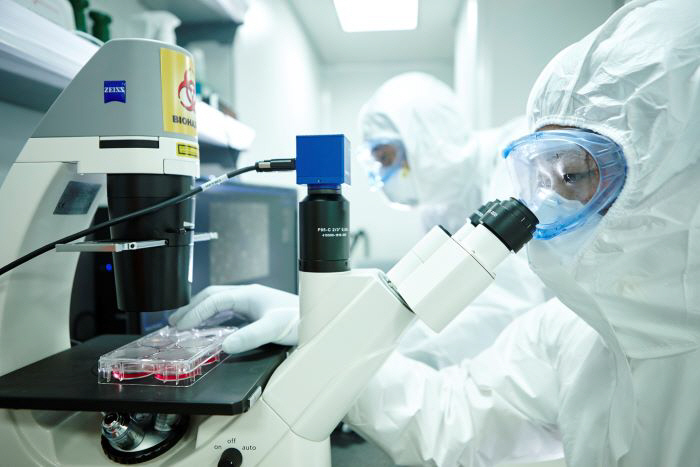The green light for the development of hantavirus prevention mRNA vaccines...Check the effectiveness of animal experiments
Mar 31, 2025
A research team at Korea University's Vaccine Innovation Center (Center Director Jung Hee-jin) announced promising results in research on mRNA vaccine development to prevent hantavirus infections.
In a preclinical study, the research team confirmed that hantavirus infection was effectively prevented after vaccination of mice for clinical trials. This study is evaluated as an important result showing the possibility of developing an effective hantavirus vaccine.
Hantavirus is a virus that spreads to the human respiratory tract through feces such as infected dorsal mice and causes fatal infectious diseases such as nephrotic syndrome hemorrhagic fever (HFRS). In Korea, about 400 cases of infection are reported every year, and the fatality rate reaches 5-15%, but there is no effective treatment so far, so they rely on conservative treatments such as hemodialysis. Accordingly, the World Health Organization (WHO) has designated hantavirus as one of the most likely viruses to cause a future pandemic and is urging the development of a vaccine.
In response, Korea University's Vaccine Innovation Center is working with Moderna, the U.S., which developed the COVID-19 mRNA vaccine, to develop an mRNA vaccine (H project) to prevent hantavirus through an mRNA access program. Professor Park Man-sung's team at the microbiology class of the ancient medical school, who was responsible for preclinical research on Project H, announced the results of a study that effectively prevents infection when an mRNA-based hantavirus vaccine was administered to experimental mice to induce immunity and then attacked with hantavirus at the Spring Conference of the Korean Vaccine Association held on March 28.
According to the study, a significant number of mice receiving the hantavirus mRNA vaccine experienced a significant reduction of the virus in their lungs and kidneys on day 5. On the other hand, large amounts of hantavirus were detected in the lungs and kidneys in mice not receiving mRNA vaccines.
"We will continue to cooperate with Moderna to develop hantavirus mRNA vaccines that have been confirmed to be protective in mice. We also plan to promote the development of general-purpose hantavirus mRNA vaccines that are effective against various variants in the long term," said Jeong Hee-jin, director of the Korea University Vaccine Innovation Center (Kodaegu Hospital's infectious medicine department).
In addition, Kim Woo-joo, a chair professor at Korea University who specializes in viral infectious diseases, said, `The effectiveness of the hantavirus mRNA vaccine identified in preclinical animal testing increases the chances of successful development of effective vaccines in the future.'"If we successfully develop a universal hantavirus mRNA vaccine, we will be able to contribute to global public health once again, succeeding the legacy of Dr. Lee Ho-wang, an ancient medical school who first discovered hantavirus in the past."
The Korea University Vaccine Innovation Center was established in September 2021 based on 10 billion won donated by honorary chairman Chung Mong-koo of Hyundai Motor Group and conducts vaccine development research to respond to future pandemics and vaccine education to train the general public and experts.
Meanwhile, nephrotic hemorrhagic fever, commonly referred to as 'epidemic hemorrhagic fever' and 'Korean hemorrhagic fever', is an endemic fever disease that is prevalent mainly in late autumn in Korea. It is known that about 150,000 cases occur every year worldwide. Neon syndrome hemorrhagic fever is an acute fever disease characterized by fever, high fever, renal failure, and bleeding, and is caused by the Hantavirus, which belongs to Genus, and the Seoul virus, and the fatality rate is reported to be 5-15%.
It is estimated that the Hantan virus causes chronic infections in rodents (back row mice, house mice, and shrews), and is excreted in feces, urine, and saliva of infected rodents, so that the air-dried virus spreads through the respiratory tract, and in rare cases, it may spread through other vectors.
In a preclinical study, the research team confirmed that hantavirus infection was effectively prevented after vaccination of mice for clinical trials. This study is evaluated as an important result showing the possibility of developing an effective hantavirus vaccine.
Hantavirus is a virus that spreads to the human respiratory tract through feces such as infected dorsal mice and causes fatal infectious diseases such as nephrotic syndrome hemorrhagic fever (HFRS). In Korea, about 400 cases of infection are reported every year, and the fatality rate reaches 5-15%, but there is no effective treatment so far, so they rely on conservative treatments such as hemodialysis. Accordingly, the World Health Organization (WHO) has designated hantavirus as one of the most likely viruses to cause a future pandemic and is urging the development of a vaccine.
In response, Korea University's Vaccine Innovation Center is working with Moderna, the U.S., which developed the COVID-19 mRNA vaccine, to develop an mRNA vaccine (H project) to prevent hantavirus through an mRNA access program. Professor Park Man-sung's team at the microbiology class of the ancient medical school, who was responsible for preclinical research on Project H, announced the results of a study that effectively prevents infection when an mRNA-based hantavirus vaccine was administered to experimental mice to induce immunity and then attacked with hantavirus at the Spring Conference of the Korean Vaccine Association held on March 28.
According to the study, a significant number of mice receiving the hantavirus mRNA vaccine experienced a significant reduction of the virus in their lungs and kidneys on day 5. On the other hand, large amounts of hantavirus were detected in the lungs and kidneys in mice not receiving mRNA vaccines.
"We will continue to cooperate with Moderna to develop hantavirus mRNA vaccines that have been confirmed to be protective in mice. We also plan to promote the development of general-purpose hantavirus mRNA vaccines that are effective against various variants in the long term," said Jeong Hee-jin, director of the Korea University Vaccine Innovation Center (Kodaegu Hospital's infectious medicine department).
In addition, Kim Woo-joo, a chair professor at Korea University who specializes in viral infectious diseases, said, `The effectiveness of the hantavirus mRNA vaccine identified in preclinical animal testing increases the chances of successful development of effective vaccines in the future.'"If we successfully develop a universal hantavirus mRNA vaccine, we will be able to contribute to global public health once again, succeeding the legacy of Dr. Lee Ho-wang, an ancient medical school who first discovered hantavirus in the past."
The Korea University Vaccine Innovation Center was established in September 2021 based on 10 billion won donated by honorary chairman Chung Mong-koo of Hyundai Motor Group and conducts vaccine development research to respond to future pandemics and vaccine education to train the general public and experts.
Meanwhile, nephrotic hemorrhagic fever, commonly referred to as 'epidemic hemorrhagic fever' and 'Korean hemorrhagic fever', is an endemic fever disease that is prevalent mainly in late autumn in Korea. It is known that about 150,000 cases occur every year worldwide. Neon syndrome hemorrhagic fever is an acute fever disease characterized by fever, high fever, renal failure, and bleeding, and is caused by the Hantavirus, which belongs to Genus, and the Seoul virus, and the fatality rate is reported to be 5-15%.
It is estimated that the Hantan virus causes chronic infections in rodents (back row mice, house mice, and shrews), and is excreted in feces, urine, and saliva of infected rodents, so that the air-dried virus spreads through the respiratory tract, and in rare cases, it may spread through other vectors.
|
This article was translated by Naver AI translator.














